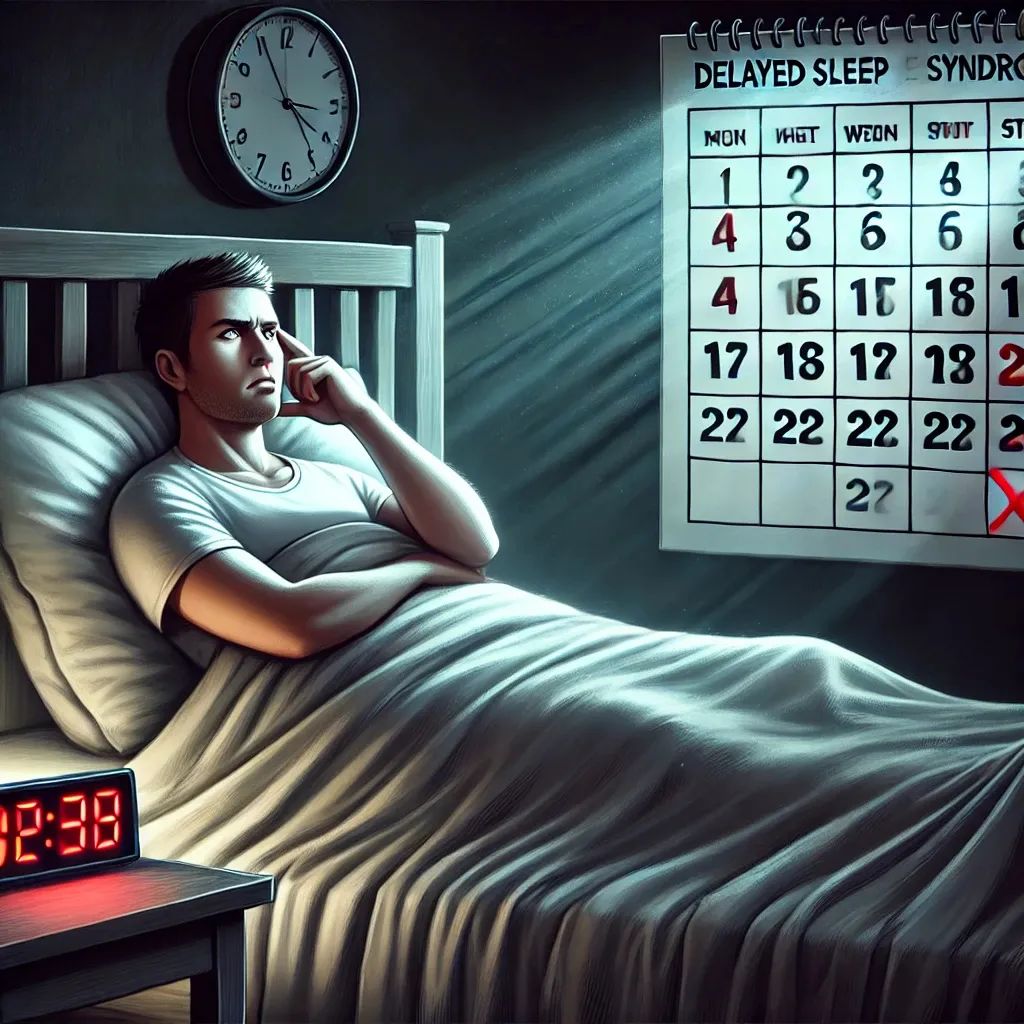
1. Definition Delayed Sleep Phase Syndrome (DSPS) is a circadian rhythm sleep disorder characterized by a significant delay in the sleep-wake cycle of the patient, typically falling asleep between 2 AM and 6 AM and waking up naturally around noon or in the afternoon. This sleep pattern is inconsistent with social and work demands, leading to daily functional impairments and a decrease in quality of life. 2. Symptoms 1. Main Symptoms – Difficulty falling asleep: Despite attempts to sleep at a normal time, patients usually cannot fall asleep until between 2 AM and 6 AM. – Difficulty waking up: Patients find it hard to wake up on time in the morning, often waking up naturally around noon or in the afternoon. – Daytime sleepiness: Due to the inability to sleep and wake at socially acceptable times, patients often feel drowsy and fatigued during the day. 2. Secondary Symptoms – Mood swings: Due to lack of sleep, patients may experience irritability, anxiety, or depression. – Impaired social and occupational functioning: Difficulty attending school or work on time, limited social activities. 3. Causes The exact cause of DSPS is not fully understood, but it may be related to the following factors: 1. Biological Factors – Delayed internal biological clock: The patient’s internal biological clock cycle may be longer than 24 hours, leading to a delay in the sleep phase. – Genetic factors: There is a familial tendency for DSPS. 2. Environmental Factors – Light exposure: Excessive light exposure at night (such as from electronic devices) may delay the internal biological clock. – Social behaviors: Irregular sleep schedules, evening work, or recreational activities. 3. Psychological Factors – Stress and anxiety: May exacerbate the delay in sleep phase. 4. Diagnosis 1. Medical History Collection – Detailed understanding of the patient’s sleep patterns, sleep and wake times, daytime functional status, and family history. 2. Sleep Diary and Questionnaires – Sleep diary: Record sleep and wake times for at least two weeks to understand sleep patterns. – Sleep questionnaires: Such as the Pittsburgh Sleep Quality Index (PSQI), Morningness-Eveningness Questionnaire (MEQ), etc. 3. Polysomnography (PSG) – Typically not used for the routine diagnosis of DSPS but can be used to rule out other sleep disorders. 4. Circadian Rhythm and Melatonin Rhythm Assessment – By monitoring body temperature and melatonin levels, assess the rhythm of the biological clock. 5. Treatment 1. Light Therapy – Morning light exposure: Immediately after waking in the morning, receive bright light exposure (5000-10000 lux) to help advance the biological clock. – Avoid nighttime light exposure: Reduce exposure to bright light at night, especially blue light. 2. Melatonin Treatment – Timed melatonin intake: Take low-dose melatonin a few hours before the scheduled bedtime to help advance the biological clock. 3. Behavioral Therapy – Sleep hygiene education: Establish a regular sleep schedule, maintaining consistent sleep and wake times, even on weekends. – Gradually advance sleep time: Gradually move bedtime and wake time earlier every few days until the target time is reached. 4. Cognitive Behavioral Therapy (CBT) – Cognitive restructuring: Correct misconceptions and irrational beliefs about sleep. – Relaxation training: Such as deep breathing, meditation, etc., to help reduce stress and anxiety. 6. Prognosis and Management 1. Long-term Management – Continuous monitoring and adjustment of treatment plans, maintaining a regular sleep schedule. – Regular follow-ups to assess treatment effectiveness and the patient’s daily functional status. 2. Education and Support – Provide education about DSPS to help patients and their families understand the condition and coping strategies. – Support groups or psychological counseling to help patients cope with emotional issues and impaired social functioning. Conclusion: Delayed Sleep Phase Syndrome is a common circadian rhythm sleep disorder that significantly affects the quality of life and daily functioning of patients. Through comprehensive assessment and individualized treatment, including light therapy, melatonin treatment, and behavioral therapy, patients’ sleep patterns and daily functioning can be effectively improved.
